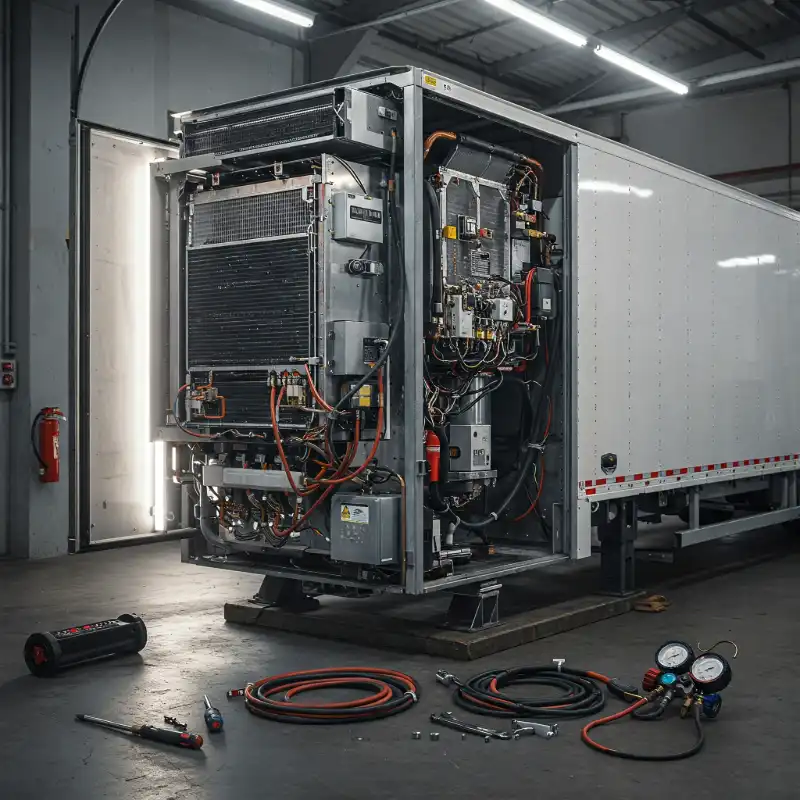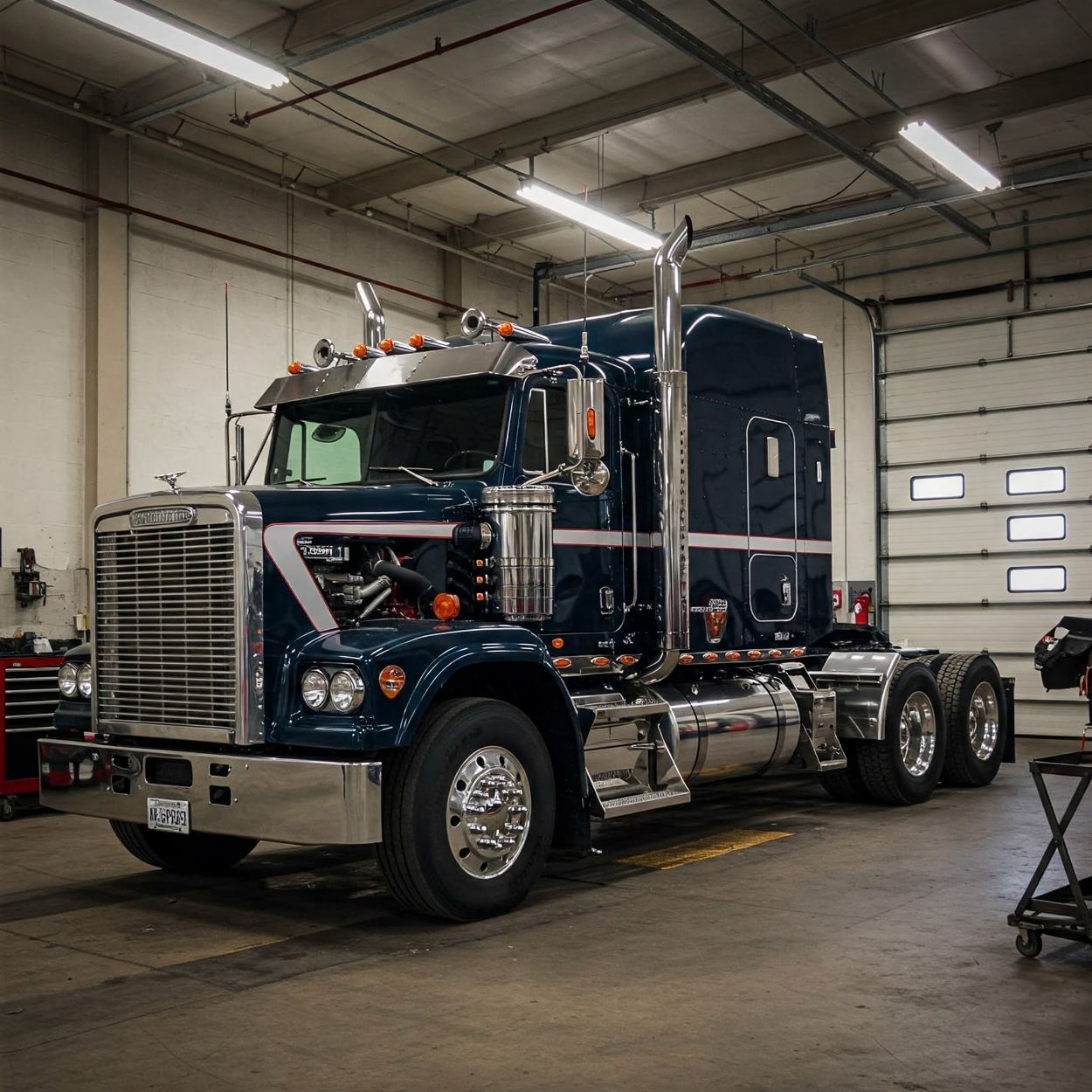
Summer heat can take a toll on grocery delivery fleets, especially in Texas, where extreme temperatures push your trucks to their limits. From overheated engines to tire blowouts, high temperatures can cause serious breakdowns if you’re not prepared. Keeping your fleet well-maintained ensures deliveries stay on schedule and perishable goods arrive fresh.
Here are seven key ways fresh from our team at Integrity Fleet to keep your grocery trucks running efficiently all summer long.
1. Prevent Engine Overheating
Hot weather stresses diesel engines, increasing the risk of overheating. Without proper cooling system maintenance, a truck could break down mid-route, leading to costly delays.
- Check coolant levels daily and top off as needed
- Inspect radiator hoses for leaks or cracks
- Ensure the cooling fan and thermostat are functioning properly
- Use the correct coolant-to-water ratio to prevent overheating
A well-maintained cooling system keeps the engine at optimal temperature, even on the hottest days.
2. Maintain Refrigeration Units for Perishable Goods
Keeping refrigeration units in peak condition is essential for grocery fleets hauling perishable items. A faulty reefer unit can lead to spoiled goods, customer complaints, and lost revenue.
- Clean condenser coils to improve cooling efficiency
- Check refrigerant levels and recharge if necessary
- Inspect door seals to prevent cold air leaks
- Monitor reefer unit temperatures regularly
Routine refrigeration system maintenance ensures groceries arrive fresh and within food safety regulations.
3. Keep Tires Properly Inflated to Prevent Blowouts
Extreme heat causes air inside tires to expand, increasing the risk of blowouts on the road. Underinflated tires wear out faster and decrease fuel efficiency.
- Check tire pressure daily and adjust to manufacturer recommendations
- Inspect tread depth to ensure proper traction
- Rotate tires regularly for even wear
- Avoid overloading trucks, which puts extra strain on tires
Proper tire maintenance improves fuel economy, safety, and overall vehicle performance.
4. Monitor Fuel Quality and Efficiency
Summer temperatures can cause diesel fuel to degrade faster, leading to clogged fuel filters and poor engine performance.
- Keep fuel tanks full to prevent condensation buildup
- Use high-quality diesel to minimize carbon deposits
- Replace fuel filters regularly to prevent clogging
- Monitor fuel economy for signs of injector problems
A clean fuel system helps trucks run efficiently, reducing downtime and unnecessary fuel costs.
5. Test Batteries and Electrical Systems
Summer heat shortens battery life, leading to unexpected failures if not properly maintained. High temperatures increase internal battery corrosion, reducing its ability to hold a charge.
- Test batteries for voltage and charging capacity
- Clean battery terminals to prevent corrosion
- Check alternators and starters for proper function
- Ensure all electrical connections are secure
A weak battery can leave a driver stranded, causing unnecessary delivery delays.
6. Keep Drivers Cool and Hydrated
Hot truck cabs create dangerous driving conditions, leading to fatigue and heat-related illnesses.
- Ensure A/C systems are functioning properly
- Replace cabin air filters for better airflow and cooling
- Stock trucks with bottled water for drivers
- Encourage frequent breaks in shaded or air-conditioned areas
A comfortable driver is a safe and productive driver, reducing the risk of heat-related incidents on the road.
7. Perform Pre-Trip and Post-Trip Inspections
Daily inspections are essential in preventing costly breakdowns, especially in extreme heat. Drivers should check:
- Engine oil and coolant levels to avoid overheating
- Brake system components for excessive wear
- Trailer refrigeration units for proper operation
- Lights, wipers, and mirrors for visibility and safety
Catching minor issues early prevents major failures, keeping trucks on schedule and deliveries running smoothly.
Final Thoughts
Summer heat can be brutal on grocery delivery trucks, but proper maintenance and preparation can prevent downtime and ensure efficient, reliable deliveries. By focusing on cooling systems, tires, fuel efficiency, and driver comfort, your fleet can easily handle Texas summers.
For expert fleet maintenance and repair services that keep your grocery fleet running strong no matter the weather, get in touch today!
More Articles


7 Errors in Refrigerated Truck Maintenance and Their Fixes
7 Errors in Refrigerated Truck Maintenance and Their Fixes
Avoid costly breakdowns and cargo loss with proper refrigerated truck maintenance. Learn about the top 7 reefer maintenance mistakes and how to fix them.


What Are the Benefits of Telematics in Managing Food Delivery Fleets?
What Are the Benefits of Telematics in Managing Food Delivery Fleets?
Discover how telematics can optimize your food delivery fleet in Texas. Reduce fuel costs, improve efficiency, enhance safety, and ensure faster deliveries with real-time tracking and smart analytics.


How to Reduce Fuel Costs in Your Grocery Delivery Fleet
How to Reduce Fuel Costs in Your Grocery Delivery Fleet
Discover effective ways to cut fuel costs in your grocery delivery fleet with tips on maintenance, route optimization, and technology in Texas.
